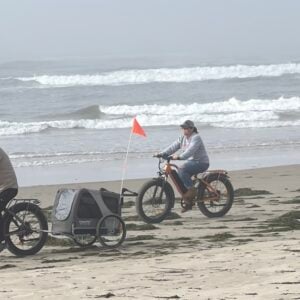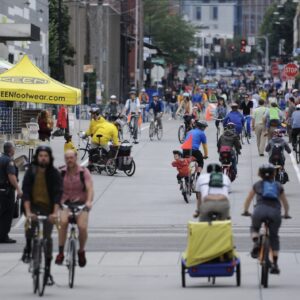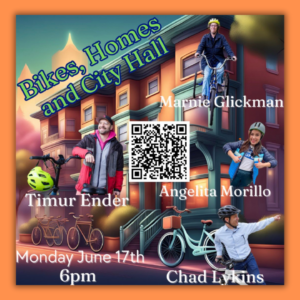
head of a local bike planning firm, Mia Birk,
wants to study the economic impact of
bicycles in Oregon.
(Photo © J. Maus)
In the past two years, Portland’s bicycle industry and the economic impact of our bike culture has gotten plenty of attention — from the New York Times to National Public Radio.
The business of bikes also gained clout on the local political scene when Portland’s City Council passed a resolution officially recognizing the bicycle industry and directing the Portland Development Commission to make it one of their “target industries”.
Amazingly, much of that high-profile attention was spurred (at least in part) by one rather small, and inexpensively done study authored by local bicycle and pedestrian planning firm, Alta Planning and Design. Alta principal Mia Birk, formerly the bicycle coordinator for the City of Portland’s Office of Transportation, spearheaded the study.
Completed in June of 2006, Bicycle-Related Industry Growth in Portland (download PDF), found that Portland’s bike culture and industry account for roughly $63 million dollars a year.
Now Birk, who says it was “one of the most cost-effective studies ever funded,” is looking to launch a more robust look at how bicycles impact the economy of not just Portland, but the entire state of Oregon.
A statewide study commissioned by the Wisconsin Department of Transportation in 2005 estimated that the annual economic benefits of bicycling in that state ranged from $765 to $835 million.

the 2006 study.
Birk wants the new study to capture, “what we believe will be a significant increase in bike-related industry”. She hopes this new study will quantify the expansion of existing business and include new businesses that weren’t in the initial study. Birk says she’s, “quite confident a substantial gain will be revealed,” and adds that she also plans to come up with a method to calculate the indirect benefit of bicycles and bike tourism across Oregon.
In her role as a board member with Cycle Oregon — a yearly ride of 2,000 people that tours small, rural communities across the state — Birk has gained a new perspective on how bicycles impact the bottom line of cities throughout Oregon; “Cycle Oregon has been an inspiration to these towns…they’ve seen what bicycles can bring and now they ‘get it’.”
To help her fund and carry out the study, Birk has begun discussions with several interested and potential partners including the City of Portland Office of Transportation, the Portland Development Commission, Travel Oregon, Travel Portland, Cycle Oregon, Portland State University, and others.
Quantifying the economic impact of bicycling is a key strategy for Birk and others who hope to establish Oregon as the country’s premier cycling destination. That effort that will be the focus of the Oregon Bike Summit, which is a part of the Governor’s Conference on Tourism and is coming to the Portland area April 4-5.







Thanks for reading.
BikePortland has served this community with independent community journalism since 2005. We rely on subscriptions from readers like you to survive. Your financial support is vital in keeping this valuable resource alive and well.
Please subscribe today to strengthen and expand our work.
Good work. The economic impact of bicycles is important to quantify. It demonstrates the rubber-to-the-road manner in which we play a part in our community\’s success. And I\’m interested to see how it has expanded since the last study. It seems like there\’s more more out there. More products, more services, more nonprofits.
Even nationwide companies like Clear Channel are cashing in on this economic boon, renting out billboards for tens of thousands of dollars to display bicycle related messages. Dialog even indicated that these rentals are at reduced rates, maybe to get more bike related business.
The economic numbers are huge when, essentially, no fuel cost has to be associated with this industry. If you can imagine a city, like Paris, where well dressed productive individuals ride bicycles as a matter of daily life, and could care less what the price of gas is.
good point, Bill. Thanks for the article, Jonathan.
Mia Birk is someone who ought to get a lot more attention from policy-makers interested in understanding how to make bicycling a safe, mainstream transportation option. She gets it.
Will it include an analysis on the consumer -level economic impacts? That is, as a bike commuter, I don\’t spend as much money on gas/parking/car maintenance, so I\’ve got more money to spend on restaurants/expensive (okay, foreign) cheeses/shiny things. A higher percentage of that money stays in the local economy, so even though the money doesn\’t appear in the \”bicycle-related\” column, it exists because it\’s not bound up in the \”automobile\” column.
Hi Martha,
I think what you are looking for has already been done, and the short answer is $2.6 Billion:
http://bikeportland.org/2007/07/16/portlands-green-policies-add-26b-to-local-economy/
The full report is really interesting.
Excellent point, Martha. when folks argue that cyclists are outside the economiic equation. Unwashed nomads with empty wallets, I say that the $4 plus a gallon drivers are going to be the ones who will stop spending funds in the local economy b/c they\’re giving it to Exxon. Good work Mia- and Martha\’s right – when quantifying things I hope there\’s a column for where cyclist\’s funds are going instead of into the tank – I know last week some of mine went to Roots pub at the social hour. We need the public at large to see that cyclists are part of the economic base but spend on hopefully spend on more sustainable goods and services.
Martha,
Austin\’s right… Joe Cortright looked at how Portland\’s \”green policies\” (including bike encouragement) are contributing to our region\’s bottom line.
Here\’s my favorite part of his study findings:
\”The $1.1 billion Portlanders don’t spend on car travel translates into $800 million that is not leaving the local region. Because this money gets re-spent
in other sectors of the economy, it stimulates local businesses rather than rewarding Exxon or Toyota.\”
I agree. Since bicycle commuting and running errands by bike, I\’m spending more on going out dining, to fuel that commute, and not feeling bad about having desert because I\’ll know I\’ll burn it off. So did I just purchase locally made and grown energy?
This Joel C study is a wonderful tool to answer critics who think cyclists are freeloading by riding on streets they think cars pay for. Not only does cycling reduce costs of said infrastructure repairs and wear and tear, but it puts 800 million back into the local region. We can use this sort of ammo to help shift the way folks look at cycling, i.e a toy or weekend rec sport only.
It\’s good to hear that you bicyclists have so much extra money to spend as opposed to us evil motorists. Now we can proceed with getting a measure on the ballot to require bicycle licenses and bike registration fees to pay for your additional and expensive bicycle infrastructure such as bike lanes and boxes, etc. We evil motorists of tired of you paying nothing while sucking our tax and fee money away from road maintenance as benefactor Adams has done for the past many years.
Nice to see her standing right next to a bunch of mountain bikes when Portland has next to no mountain biking within even 45 minutes of Portland.
Hey, Mr. Happy! (#11)
You don\’t sound very happy to me. And whose calling motorists \”evil\”? I\’ve never seen that on this site. Those are your own words, and no one else\’s. Perhaps you should get on a bike and join us for a day. Then you might find out what it\’s like to be happy!
[PS. I know I\’m not supposed to feed the trolls … sorry!]
Mr. Happy, if you\’ll go back and research its origins, I think you\’ll find that a key reason bicycle infrastructure has been supported by transportation planners, is that bike infrastructure is a comparatively cheap, easy way to address congestion represented by ever increasing numbers of motor vehicles.
Build bike infrastructure and people will ride a bike rather than add one more car, one more car, one more car… to the growing numbers of cars stuck on the highway during rush hour.
As a means of reducing the need for higher volume motor vehicle capacity road infrastructure, it\’s cheaper and more effective to build bike lanes and bike boxes than it is to build ever bigger and wider streets and highways.
Where\’s rixter when you need him?